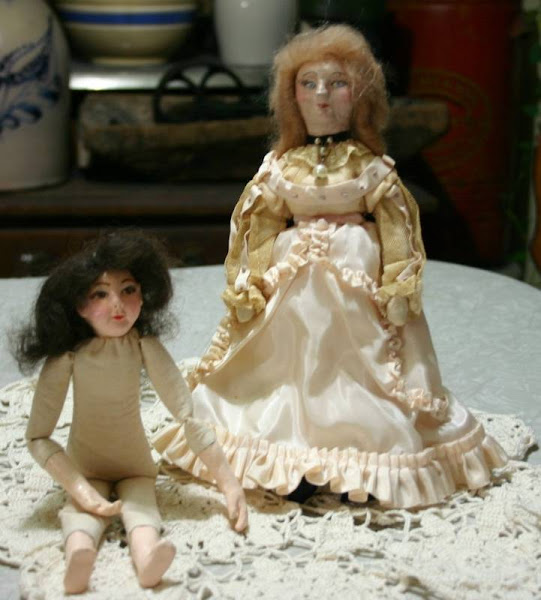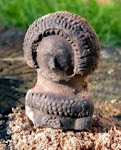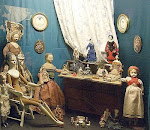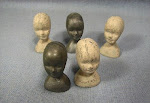| Edgar Bergen and Charlie McCarthy, Public Domain |
Thursday, April 27, 2017
Big Bang Theoory; Ventriloquist Dummies and Dolls
Big Bang Theory is a show that is both full of dolls, toys, and action figures, but also a show whose characters are made into dolls. Tonner and Funko have created examples, to name a couple of companies. But, tonight's new episode featured a southern belle Ventriloquist dummy named Tammy Jo St. Cloud, that belonged to Bernadette. Ah, I loved her; she brought back shades of Mr. Woody, Madame, and of course, Charlie McCarthy. Sometimes life is full of Serendipity. a couple of weeks ago, I found the head of a Ventriloquist dummy, doll, Willie Talk, on an antiquing trip. Tonight, the show was about them. The dummies show up on "Alfred Hitchcock Presents," every so often, and AH himself talked about how he was once a puppeteer in Vaudeville. Hence his theme Gounod's "Funeral March of the Marionette", another type of puppet. Last night, there was a Ventriloquist dummy on Johnny Carson. Of course, there is Dead Silence, fort he more macabre among us. It's 8:34 pm ET; do you know where your dummy is!!!!!
Wednesday, April 26, 2017
That is not what that was About!! (.com, that is)
Many of you know that I was the last expert guide for doll collecting at about.com. I loved being the expert guide, and wrote until the doll collecting site was discontinued. The Co.'s new CEO decided that its readers were not interested in collectibles, despite the fact that the NY Times, which owns the search engine, has a weekly arts column in the Sunday paper on collecting. About was no longer interested in new content, merely in having its IT folks and other employees update old content. As a result, the site uses a format similar to Pinterest. There is a doll collecting site, but many of my articles have disappeared. Links to them take you elsewhere, not to my articles. Also, please note that often, my photos are put on articles written by others. What's worse, the wrong photo is often put on the wrong article, if any of my articles are still there. For example, I wrote on the Marque that broke a record at the Stein am Rhein auction Theriault's. The photo the new editors put with the article was of the German bisque K*R 108 auctioned by Bonham's for nearly $400,000. The new editors are not experts in dolls, and while they are trying to update the site to the best of their ability, I feel I should write a disclaimer that I have not committed these errors. Also, while this was my dream job, I have to say that I was more interested in writing my own original content than in receiving directives to update the material of the old guide. For the last 10 months or so, I was compelled to update and edit the old guide's work. I am a good editor, but believe me, I have enough original material to write at least 1000 books on dolls. So, enough said. I miss About, but love my Blogs, my job with Antique Doll Collector, my blogging for R. John Wright, and Ruby Lane, and my own writing. Happy Collecting! Dr. E
 |
| Corn cob doll, Native American Made. Author's Collection |
Friday, April 21, 2017
My Ballerina Dolls on ABC Show The Toy Box
I exchanged emails with the creators of My Ballerina a year or so ago, then wrote a post on them for About.com. I hope they do well. I took ballet for a long time, and love it. My favorite movie is The Turning Point, so I hope they do well .
Update: My Ballerina Won on April 14th, 2017!!
By way of celebration, here is a gallery of public domain images of other ballerinas and ballerina dolls!
Update: My Ballerina Won on April 14th, 2017!!
 |
| Nutcracker by My Ballerina, public domain and Myballerinadolls.com |
By way of celebration, here is a gallery of public domain images of other ballerinas and ballerina dolls!
My Article on the 14th Amendment is Published Online!
I'm very excited about this, so forgive me for posting something not doll related, though I do have plenty of dolls that represent lawyers, and dolls are the subject of many law suits. Thanks to my colleagues at Concord Law School!!
Griswold v. Connecticut, Shades of Privacy, and the Penumbras of the 14th Amendment
https://www.concordlawschool.edu/student-life/law-day/contraception-and-the-14th-amendmentBy Ellen M. Tsagaris, JD, PhD, Kaplan University Program Chair of Legal/Paralegal Studies, Public Safety, and Humanities/Composition
No discussion of the 14th Amendment Due Process Clause would be complete without a retrospect of Griswold v. Connecticut, 381 U.S. 479 (1965). The case examined what Justice Stewart described as Connecticut’s “uncommonly silly law.” Griswold at 527. The law prohibited the use of contraceptives.
That Justice William O. Douglas, one of the most colorful and liberal justices to ever serve on the Court, should write the opinion makes the holding even more significant, if not controversial. One can almost see him sputtering as he writes, “We do not sit as a super-legislature to determine the wisdom, need, and propriety of laws that touch economic problems, business affairs or social conditions. This law, however, operates directly on an intimate relation of husband and wife and their physician’s role in one aspect of that relation.” Id. at 485. Certainly one of the biggest concerns he and his fellow justice shared about Sections 53-32 and 54-196 of the General Statutes of Connecticut (1958 rev.) is that its enforcement would severely impact a fundamental right like the marital relationships; to enforce it, the State would have to play peeping Tom to determine if married couples were or were not using contraception.
The statute in question was originally drafted in 1879, and made any kind of birth control illegal, even when used by married couples. Hall, Kermit, Ed. The Oxford Companion to the Supreme Court of the United States. 2d edition. Oxford University Press, 2005 at 408. Of course, this is long before The Pill. As Kenneth Hall has pointed out, the statute had been challenged twice before in Tileston v. Ullman, 318 U.S. 1944 (1943) and Poe v. Ullman, 367 U.S. 497 (1961), Hall at 408. Both attempts failed, largely on grounds of standing and procedural grounds. But on the merits, even the State of Connecticut thought the law was silly and needed to be repealed and declared unconstitutional.
Four years after Poe v. Ullman, the 1879 statute met its match in Griswold v. Connecticut. Briefly, the relevant facts of Griswold are as follows. Estelle Griswold, Executive Director of the Planned Parenthood League of Connecticut, and Dr. C. Lee Buxton, another administrator and consultant, were arrested in 1961 for violating the Connecticut statute prohibiting birth control between married couples and another statute. They allegedly gave birth control advice to married people. They were both convicted, and Connecticut’s Appellate Division of the Circuit Court and the Connecticut Supreme Court of Errors affirmed their convictions. Griswold and Buxton appealed to the United States Supreme Court. The Supreme Court determined that they had standing to represent married people who had consulted them. Griswold at 486.
Justice Douglas wrote the majority opinion, which held that the 1879 Connecticut anti-birth control law was unconstitutional because it violated the protected right to privacy of married couples. Id. As Justice Douglas writes, “We deal with a right of privacy older than the Bill of Rights—older than our political parties, older than our school system. Marriage is a coming together...intimate to the degree of being sacred….it is an association for as noble a purpose as any involved in our prior decisions.” Griswold at 486. Justices Goldberg and Brennan and Chief Justice Warren concurred. Justices Stewart and Black Dissented, more on grounds of strict construction of the Constitution and the Original Intent [of the Framers] Doctrine than in support of Connecticut’s “silly” law.
Fourteenth Amendment
Early in his opinion, Justice Douglas addressed the relationship of the Fourteenth Amendment to Griswold: “Coming to the merits, we are met with a wide range of questions that implicate the Due process Clause of the Fourteenth Amendment.” Id. at 485. Additional rights interpreted as coming under the Due Process Clause included the “propriety of laws that touch economic problems, business affairs, or social conditions” as well as the intimate relationship between married couples. Id.
In his concurring opinion, Justice Goldberg, with whom Chief Justice Warren and Justice Brennan concurred, writes: “The Court stated many years ago that the Due Process Clause [of the Fourteenth Amendment] protects those liberties that are ‘so rooted in the traditions and conscience of our people as to be ranked as fundamental.’” 381. U.S. 479, 487 (Goldberg, J., concurring).
The relevant language of the Fourteenth Amendment reads: “nor shall any state deprive any person of life, liberty, or property, without due process of law.” U.S.Const. amendment XIV. sect. I. According to Justice Douglas in Griswold, the right to privacy is part of the liberty interest of the Fourteenth Amendment, further defined by the penumbras and emanations of the Bill of Rights. Griswold, at 484. A penumbra is, broadly, an area that is partly shaded, and partly dark, like an eclipse. (Merriam Webster Dictionary). The word also means a type of shadow or gray area in general. In legal reasoning and writing, a penumbra is a group or body of rights implied, yet not specifically identified by the Constitution, especially when they are rights implied by the penumbra of the Bill of Rights. Burton, Legal Thesaurus. Penumbral rights are defined by reading the Constitution, the Bill of Rights, and case precedents together, and then noticing common threads among them. The Ninth Amendment with its “zone of privacy” or area of potential rights left to the states to identify is important to a discussion of penumbras. Griswold; Hall at 408. According to Rideout, “the Ninth Amendment sets the stage for penumbral reasoning when it states that the ‘enumeration in the Constitution, of certain rights, shall not be construed to deny or disparage others retained by the people.’” U.S. const. amend XIX; Rideout, J. Christopher. Penumbral Thinking Revisited: Metaphor in Legal Argumentation, 7 J. Ass’n Legal Writing Directors 155, 173 (Fall 2010).
When combined with the penumbras of the Ninth Amendment, the First, Third, and Fourth Amendments create the right to privacy, especially in marital relations, which then falls under the liberty interest of the Fourteenth Amendment. In part, Justice Douglas found that distributing birth control literature and information and reading it was included in the First Amendment’s guarantee of free speech. (485). He reasoned that these are peripheral rights identified in Meyer v. Nebraska, 262 U.S. 390 (1923), and Martin v. Struthers, 319 U.S. 141 (1943). Justice Douglas also reasoned that freedom of association, a peripheral First Amendment right, also applied as held by NAACP v. Alabama, 357 U.S. 449, 462 (1964). In short, the First Amendment “has a penumbra where privacy [like marital choice to use contraception] is protected from governmental intrusion.” An outraged Justice Douglas declared: “Would we allow the police to search the sacred precincts of marital bedrooms for telltale signs of the use of contraceptives? The very idea is repulsive to the notions of privacy surrounding the marriage relationship.” Griswold at 486. With this statement, Justice Douglas invoked concepts emanating from the Fourth and Fifth Amendment protections against illegal search and seizure and self-incrimination.
Conclusion
Justice Cardozo wrote long before the holding of Griswold that, “There is in all such controversies a penumbra where rigid formulas must fail. No test more definite can then be found than the discretion of the court, ‘to be carefully and guardedly exercised’ in furtherance of justice.” Cardozo quoted in Rideout 168.
That Justice Douglas chose to argue through metaphor and analogy is nothing new in the study of jurisprudence and legal writing. As a liberal constructionist, he followed the theory that the Framers created the Constitution as a living document to adapt to future generations and social mores that they could not have forecasted. The Fourteenth Amendment itself did not even exist then. It is for this reason that the Constitution may be amended, albeit with great difficulty. Thomas Jefferson, as an aficionado of science and medicine, would have understood Justice Douglas’s reasoning, as would Justice John Marshall, who stated that “[i]t is emphatically the province and duty of the Judicial Department to say what the law is,” or, in other words, the Constitution is what the judges say it is. Marbury v. Madison, 5 U.S. 137, 177 (1803). Today, the Fourteenth Amendment, as applied to the states, defends recognized rights like protection from electronic search and seizure, as well as those relating to lifestyle, reproductive rights, voting, education, association, religion, and travel, in ways not known when the Constitution and Bill of Rights were originally drafted. Griswold lives on today and has been cited in cases addressing issues of abortion, rights to birth control for unmarried couples, and the right to engage in same sex intimate relationships.
Griswold and its progeny illustrated the Fourteenth Amendment’s power to identify implied rights, like the right of privacy, and apply those and other protections of the Bill of Rights to the states. The debate and dialogue continue today, with questions about the Second Amendment and the right to bear arms, among others. Griswold is an eloquent condensed study of the Constitution and Bill of Rights themselves.
Dr. Ellen M. Tsagaris is the Chair of Legal Studies/Paralegal Studies, Public Safety, Fire Science, and Humanities/Composition at Kaplan University’s Davenport, Iowa campus. The views expressed in this article are solely those of the author and do not represent the view of Concord Law School at Kaplan University, including its parent companies, subsidiaries, and affiliates.
Wednesday, April 12, 2017
Dr. E's Doll Museum Blog: Androids and The Nightstalker
Dr. E's Doll Museum Blog: Androids and The Nightstalker: This was one of my favorite TV shows when I was in junior high. On the rerun tonight, kolschak, aka Darrin McGavin, hunted down an Android p...
Androids and The Nightstalker
This was one of my favorite TV shows when I was in junior high. On the rerun tonight, kolschak, aka Darrin McGavin, hunted down an Android programmed to feel emotion. Also, think back to Philip K. Dick's Do Androids dream of Electric Sheep? The show was ahead of its time, but it is s theme that is ancient.
Tuesday, April 4, 2017
Bach and Dolls
 |
| Public Domain Image |
What do the great composer Johann Sebastian Bach and dolls have in common--well, Bach was from Thuringia, where so many dolls were made at the height of the German doll industry. We listened Sunday to an inspiring program on the great composer by Senator Don Wooten, music enthusiast and all around Renaissance man.
 |
| Thuringia Public Domain |
 |
| Public Domain |
 |
| Thuringia Sausage Dog Public Domain |
 |
| Thuringia 1645 |
 |
| Thuringia Xmas Market Public Domain |
Myrtle Young; The Potato Chip Collector
Myrtle Young; The Potato Chip Collector
The older I get, the more I love potato chips, and things
made with them including potato chip chicken and yes, potato chip cookies. I love the flavored examples, Lays prawn,
gyros, Reuben, and Pringles in all their varieties. I think sea salt & vinegar are my
favorites. I don’t even need dip any
more. It follows that other people share
the passion, but one very unusual lady took it a step further. She collected potato chips that looked like
faces or other figural objects. Her
collection and plans for a museum landed her on The Tonight Show with Johnny Carson Carson
was joking about earthquakes in the Los
Angeles
 |
| Public Domain Image of Johnny Carson looking at Myrtle's Figural Chip |
Back to chips, and what they have to do with dolls. Well,
let’s “face” it; I have sympathy for anyone who wants to start a museum. Also, I was hooked when Ms. Young said she
saw faces in the chips, and sure enough, one looked like Tweety bird, another
like a smiley face. Another looked like
Snoopy, one was a dinosaur. A delicate
candle shown through one chip. Another
was a dog’s face; they were all very clear.
She was inspired to collect because she worked as a chip inspector, and
had to select those that didn’t make the grade.
 |
| Myrtle's Potato Chips in their Tupperware Case. Public Domain Image |
I thought of little dolls I have made from pieces of orange
peel, painted to look like Santas and other characters. Others I have are made of crushed soda cans
that have been painted. Pieces of shell and driftwood in my collection are also
painted to look like little figures. An article on prehistoric dolls postulated
that the first Stone Age dolls may have been a rock or piece of wood that
resembled a person. Dolls are not only where you find them, but how you see them.
So, the potato chip lady isn’t far off. Dolls, and art, can come from anything. Don’t smirk; how many of you out there look
at clouds, or ink blots, and see all kinds of shapes! Actually, I collected a
potato chip bag of Voodoo Doll potato chips that boast spicy New Orleans
If people can have their potatoes that look like late
President Richard Nixon, or pieces of toast imprinted with the image of Jesus
or The Virgin Mary, Ms. Young can have her anthropomorphic potato chips! Myrtle Young died in 2014 at age 90. May she rest in peace, and I hope her collection, lovingly kept in
Tupperware cake pans, is somewhere kept
safe in her memory.
 |
| Public Domain Image |
Doll Artist Sherman Smith
On September 22, 1907, an amazing woodcarver/ doll artist
named Sherman Smith was born. For many
years, his work was unknown. Now, there
is a thriving interest on eBay in his creations. Collectors are specializing in
his wooden dolls, and wooden dolls with bisque heads, some antiques, and some artist’s
reproductions by Phyllis Park and Jean Johnson.
My first encounter with a Smith doll took place in 1975 when
we visited the now defunct Dolly Dear Clinic, one of our local doll hospitals.
[The demise of the doll hospital will be another topic]. The owner sold a few dolls and parts now and
then, but while she was a lovely lady with a first-rate collection [Bru,
Jumeau, complete Schoenhut families, rare china, wax, and Parian, all mint!]; she
was a terrible doll snob. Since I was a
teenager, she had hopes for me, but she sneered at my small lowbrow china head that
needed parts. She sold me the Smith
doll, about 8 inches, with porcelain “Marie Antoinette” head for about
12.00. My mom shelled it out, even though
she thought the price was high. A similar doll was selling on eBay this week
for 225.00. I have seen it as high as
350.00.
Mr. Smith began making dolls and carving after a heart
attack in 1955. Allegedly, he was on bed
rest for three years. His first projects were heart shaped pins and
interlocking chains, good exercises for a man who had been a whittler since age
8. Soon, he was winning prizes, and
inspired to carve a doll featured in a craft magazine. A meticulous craftsman, Smith spent a year
perfecting his doll making skills. His
first dolls were up to 24 inches high; these are rare and can command over
$1000.00. He soon decided to carve dolls
between ½ inch and 7 inches. Smith
dolls were never dressed, and early dolls were not signed. Later Examples made in the ‘60s were
signed. He carved Hitty, Miss Unity,
Mary Poppins and other characters. He
did tuck comb dolls, and tiny brooches with wooden dolls on them. The brooches were numbered. He began making
the bodies with bisque heads. Some had
his initials, some not. These bisque
headed dolls resemble 1850 china heads with wooden bodies featured in John
Noble’s books. He carved a souvenir doll for the UFDC in 1963 called Miss
Angelita, and Patty Reed’s Doll for the Sacramento Doll Club. This doll represented the doll belonging to
one of the hapless children of The Donner Party. Miss Angelita sold for 179.00 in eBay in
2012. There is a Sherman Smith Doll
Club, and I have a Raggedy Ann they made, with their logo of a wooden doll and
his name embroidered into the doll’s body.
Smith died in 1977, just two years after I bought my first
Smith doll. Shortly after, a 5 inch, unsigned
Penny Wooden joined my Marie Antoinette.
Two four inch bisque headed twins joined them last year. Prices have spiked on eBay; I see ranges from
95.00 for small dolls with bisque heads, to 400.00 for characters with bisque
heads like Lincoln . Now,
there are books, newsletters and articles about his work. An Internet search will provide many good
sources to learn about this talented doll maker.
Doll Museum: Theriault's April 5th; all Photos Courtesy of our ...
Doll Museum: Theriault's April 5th; all Photos Courtesy of our ...: Don't forget to pre-register here . Theriault's Rendezvous, Nights at the Auction , are conducted at Theriault's headquart...
Sunday, April 2, 2017
Of Pupptets for Whooping Cranes, Crystals, Fossils, and Collecting Passion
Once again, I paraphrase Eleanor St George from the proposition that doll collectors are not single-minded, perhaps no collector is. Also, dolls and collecting are everywhere. Take that Mr. Fogel at about! Last weekend on Sunday Morning, whooping cranes were being raised with crane puppets as their mothers. A collection of gigantic fossils and crystals protected in a private museum was also featured. The owners want to retire, and want to sell it intact. The husband gave up medical school to pursue them around the world. My mother was rock hound, as am I, and I was spellbound, as much by the passion of this collector as by his magnificent acquisitions. I had to share what I saw, but go on the CBS website, look for Programs, Sunday Morning, March 26, 2017.


Tete Jumeau Simon & Halbig
Here is one of our newest finds; I am in the process of redressing her. She is a doll with a head marked "tete Jumeau", but was also made with Simon&Halbig as a hybrid doll. She came to me from Fritzes' Antiques. To read more of these dolls, consult The Dolls of Three Centuries, by Eleanor St. George. She will have shoes and stockings today, and bow. Pantalets are next. Lovely dress is from Gigi's dolls and Sherry's Teddy Bears.
March 25, 2017- Long Live Freedom, Long Live Greece, My Birthplace and the Birthplace of Democracy! - Gallery of Greek Dolls
Well, I got behind. Better late than never, and the Revolution lasted longer than one day. I did post on Dr. E's Doll Museum in Greek. Last week was Greek Independence day, e.g., March 25, 2017. So we offer a gallery of Greek dolls, and we also honor the spirit of the heroes of the Revolution, including Lord Byron, Kolokotronis, and Bouboulina, the woman warrior and freedom fighter. We also honor the memory of Queen Amalia, the first modern queen of Greece, who came from Germany. She gave the Greek people the national costume for women, The Amalia, which is her compilation of contemporary Greco dress and Biedermeier style.
 |
| Greek Theatrical Doll. Porcelain head. Tsagaris collection. |
 |
| Greek bottle doll, meant as an Ouzo bottle Tsagaris Collection A soldier, or Evzon is her companion. |
 |
| Greek Dolls, Tsagaris Collection |
 |
| Center doll is Greek soldier, c. 1930. Doll on L is Scottish, on right, Egyptian. Tsagaris collection. |
 |
| Wax over dolls, c. 1880, glass eyes, Greek costume. |
 |
| Cycladic Idol, addressed by Barbara Pym in A Few Green Leaves. Cincinnati Museum of Art, photo, Dino Milani. |
| THE isles of Greece! the isles of Greece | |
| Where burning Sappho loved and sung, | |
| Where grew the arts of war and peace, | |
| Where Delos rose, and Phoebus sprung! | |
| Eternal summer gilds them yet, | |
| But all, except their sun, is set. | |
| The Scian and the Teian muse, | |
| The hero's harp, the lover's lute, | |
| Have found the fame your shores refuse: | |
| Their place of birth alone is mute | |
| To sounds which echo further west | |
| Than your sires' 'Islands of the Blest. | |
| The mountains look on Marathon— | |
| And Marathon looks on the sea; | |
| And musing there an hour alone, | |
| I dream'd that Greece might still be free; | |
| For standing on the Persians' grave, | |
| I could not deem myself a slave. | |
| A king sate on the rocky brow | |
| Which looks o'er sea-born Salamis; | |
| And ships, by thousands, lay below, | |
| And men in nations;—all were his! | |
| He counted them at break of day— | |
| And when the sun set, where were they? | |
| And where are they? and where art thou, | |
| My country? On thy voiceless shore | |
| The heroic lay is tuneless now— | |
| The heroic bosom beats no more! | |
| And must thy lyre, so long divine, | |
| Degenerate into hands like mine? | |
| 'Tis something in the dearth of fame, | |
| Though link'd among a fetter'd race, | |
| To feel at least a patriot's shame, | |
| Even as I sing, suffuse my face; | |
| For what is left the poet here? | |
| For Greeks a blush—for Greece a tear. | |
| Must we but weep o'er days more blest? | |
| Must we but blush?—Our fathers bled. | |
| Earth! render back from out thy breast | |
| A remnant of our Spartan dead! | |
| Of the three hundred grant but three, | |
| To make a new Thermopylæ! | |
| What, silent still? and silent all? | |
| Ah! no;—the voices of the dead | |
| Sound like a distant torrent's fall, | |
| And answer, 'Let one living head, | |
| But one, arise,—we come, we come!' | |
| 'Tis but the living who are dumb. | |
| In vain—in vain: strike other chords; | |
| Fill high the cup with Samian wine! | |
| Leave battles to the Turkish hordes, | |
| And shed the blood of Scio's vine: | |
| Hark! rising to the ignoble call— | |
| How answers each bold Bacchanal! | |
| You have the Pyrrhic dance as yet; | |
| Where is the Pyrrhic phalanx gone? | |
| Of two such lessons, why forget | |
| The nobler and the manlier one? | |
| You have the letters Cadmus gave— | |
| Think ye he meant them for a slave? | |
| Fill high the bowl with Samian wine! | |
| We will not think of themes like these! | |
| It made Anacreon's song divine: | |
| He served—but served Polycrates— | |
| A tyrant; but our masters then | |
| Were still, at least, our countrymen. | |
| The tyrant of the Chersonese | |
| Was freedom's best and bravest friend; | |
| That tyrant was Miltiades! | |
| O that the present hour would lend | |
| Another despot of the kind! | |
| Such chains as his were sure to bind. | |
| Fill high the bowl with Samian wine! | |
| On Suli's rock, and Parga's shore, | |
| Exists the remnant of a line | |
| Such as the Doric mothers bore; | |
| And there, perhaps, some seed is sown, | |
| The Heracleidan blood might own. | |
| Trust not for freedom to the Franks— | |
| They have a king who buys and sells; | |
| In native swords and native ranks | |
| The only hope of courage dwells: | |
| But Turkish force and Latin fraud | |
| Would break your shield, however broad. | |
| Fill high the bowl with Samian wine! | |
| Our virgins dance beneath the shade— | |
| I see their glorious black eyes shine; | |
| But gazing on each glowing maid, | |
| My own the burning tear-drop laves, | |
| To think such breasts must suckle slaves. | |
| Place me on Sunium's marbled steep, | |
| Where nothing, save the waves and I, | |
| May hear our mutual murmurs sweep; | |
| There, swan-like, let me sing and die: | |
| A land of slaves shall ne'er be mine— | |
| Dash down yon cup of Samian wine! |
|
Subscribe to:
Comments (Atom)


























































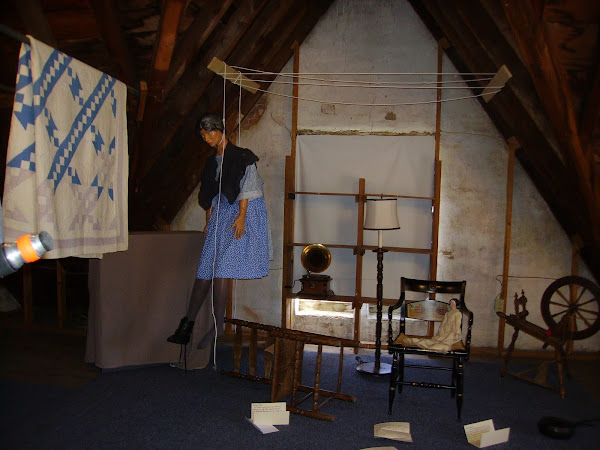
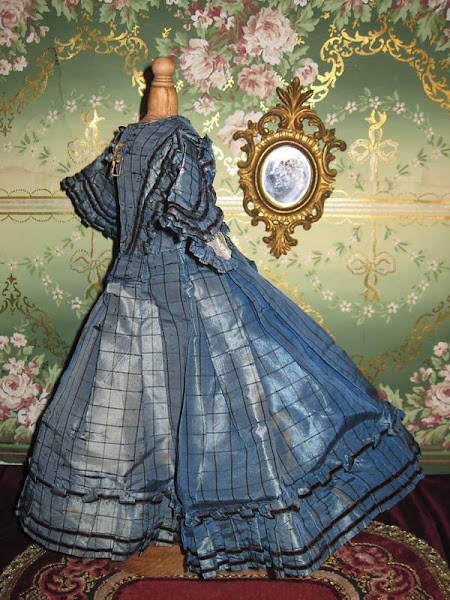wCWk~%24(KGrHqV,!h8Ew5GsnS3dBMUy3MzVPg~~_3.jpg)


